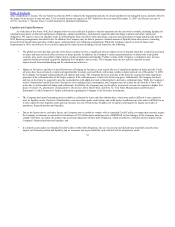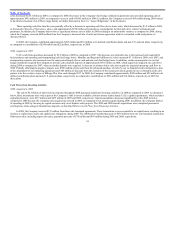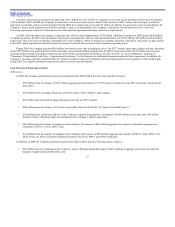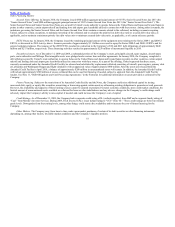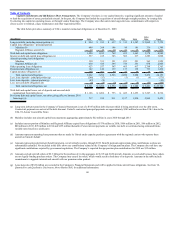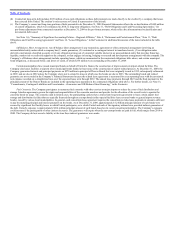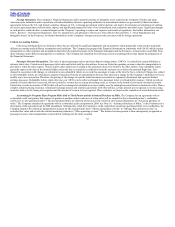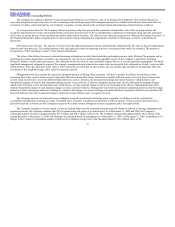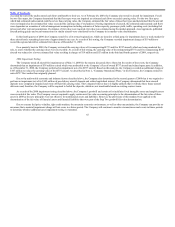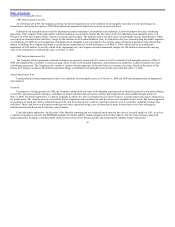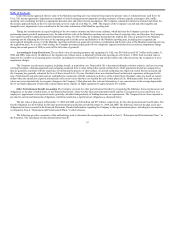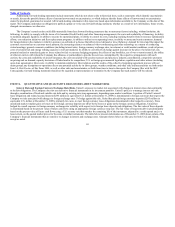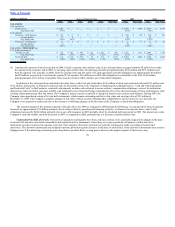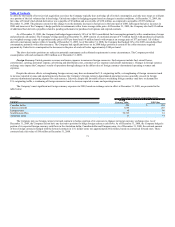United Airlines 2009 Annual Report Download - page 66
Download and view the complete annual report
Please find page 66 of the 2009 United Airlines annual report below. You can navigate through the pages in the report by either clicking on the pages listed below, or by using the keyword search tool below to find specific information within the annual report.
Table of Contents
Other Information
Foreign Operations. The Company’s Financial Statements reflect material amounts of intangible assets related to the Company’s Pacific and Latin
American route authorities and its operations at London Heathrow. Because operating authorities in international markets are governed by bilateral aviation
agreements between the U.S. and foreign countries, changes in U.S. or foreign government aviation policies can lead to the alteration or termination of existing
air service agreements that could adversely impact, and significantly impair, the value of our international route authorities and other assets. Significant changes
in such policies could also have a material impact on the Company’s operating revenues and expenses and results of operations. For further information, see
Item 1, Business—International Regulation, Item 7A, Quantitative and Qualitative Disclosures About Market Risk and Note 3, “Asset Impairments and
Intangible Assets” in the Footnotes, for further information on the Company’s foreign currency risks associated with its foreign operations.
Critical Accounting Policies
Critical accounting policies are defined as those that are affected by significant judgments and uncertainties which potentially could result in materially
different accounting under different assumptions and conditions. The Company has prepared the Financial Statements in conformity with GAAP, which requires
management to make estimates and assumptions that affect the reported amounts in the Financial Statements and the Footnotes. Actual results could differ from
those estimates under different assumptions or conditions. The Company has identified the following critical accounting policies that impact the preparation of
the Financial Statements.
Passenger Revenue Recognition. The value of unused passenger tickets and miscellaneous charge orders (“MCOs”) is included in current liabilities as
advance ticket sales. United records passenger ticket sales and tickets sold by other airlines for use on United as operating revenues when the transportation is
provided or when the ticket expires. Tickets sold by other airlines are recorded at the estimated values to be billed to the other airlines. Non-refundable tickets
generally expire on the date of the intended flight, unless the date is extended by notification from the customer on or before the intended flight date. Fees
charged in association with changes or extensions to non-refundable tickets are recorded as passenger revenue at the time the fee is collected. Change fees related
to non-refundable tickets are considered a separate transaction from the air transportation because they represent a charge for the Company’s additional service to
modify a previous reservation. Therefore, the pricing of the change fee and the initial customer reservation are separately determined and represent distinct
earnings processes. Refundable tickets expire after one year. MCOs can be either exchanged for a passenger ticket or refunded after issuance. United records an
estimate of tickets that have been used, but not recorded as revenue due to system processing errors, as revenue in the month of sale based on historical results.
United also records an estimate of MCOs that will not be exchanged or refunded as revenue ratably over the redemption period based on historical results. Due to
complex industry pricing structures, refund and exchange policies and interline agreements with other airlines, certain amounts are recognized as revenue using
estimates both as to the timing of recognition and the amount of revenue to be recognized. These estimates are based on the evaluation of actual historical results.
Accounting for Frequent Flyer Program Miles Sold to Third Parties and the Advanced Purchase of Miles. The Company has an agreement with its
co-branded credit card partner that requires its partner to purchase miles in advance of when miles will be awarded to the co-branded partner’s cardholders
(referred to as “pre-purchased miles”). The pre-purchased miles are deferred when received by United in our Financial Statements as “Advanced purchase of
miles.” The Company amended its agreement with its co-branded credit card partner in 2008. See Note 16, “Advanced Purchase of Miles,” in the Footnotes for a
description of this agreement and its 2008 amendment. Subsequently, when the Company’s credit card partner awards pre-purchased miles to its cardholders, the
Company transfers the related air transportation element for the awarded miles from “Advanced purchase of miles” to “Mileage Plus deferred revenue” at
estimated fair value and records the residual marketing element as “Other operating revenue.” The deferred revenue portion is then subsequently recognized as
passenger revenue when transportation is provided in exchange for the miles awarded.
62


